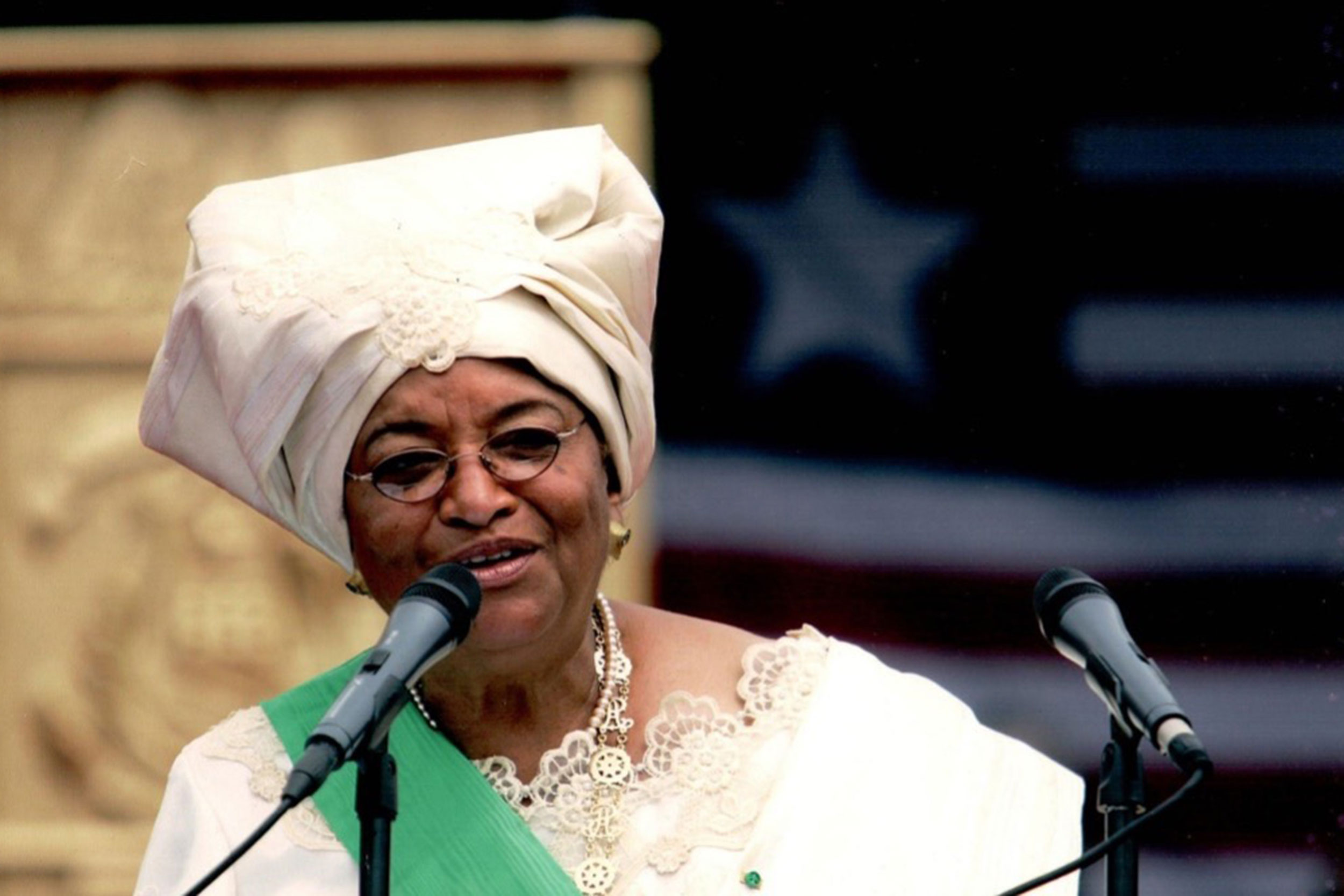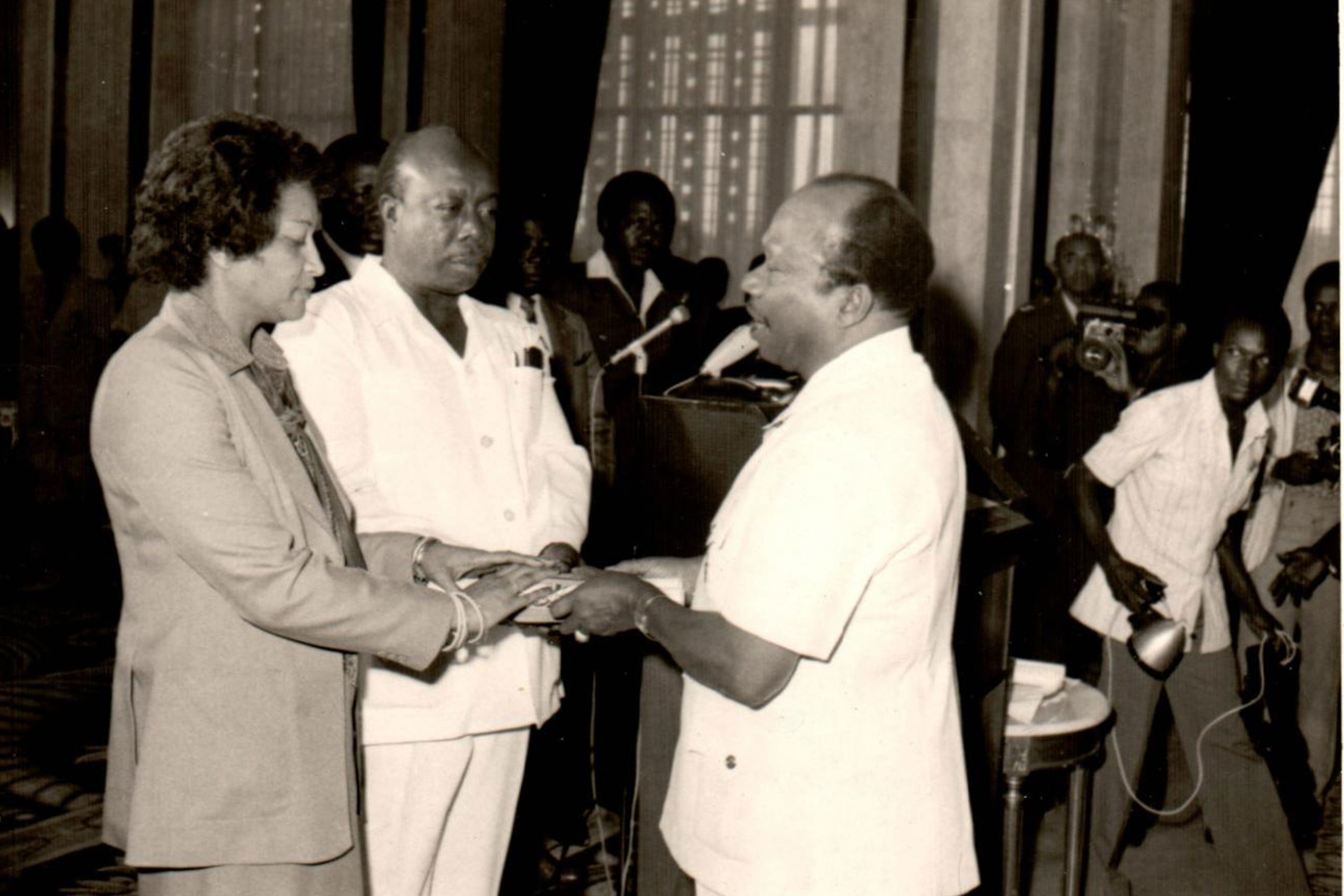
President Ellen Johnson Sirleaf giving her inaugural address in Monrovia, Liberia, in 2006.
Photos courtesy of Ellen Johnson Sirleaf Presidential Center for Women and Development
In new collecting model, former Liberian president Sirleaf’s papers come to Harvard Library
University will steward papers, making them publicly discoverable and accessible, for at least 25 years
When determining the best place to hold six decades’ worth of her personal and professional archives, former Liberian President Ellen Johnson Sirleaf, M.P.A. ’71, had two goals in mind. She wanted global reach for her archives, which would enable scholars worldwide to learn from them. And, with so many of the materials being deeply connected to her tenure as president and her work to secure peace in Liberia, Sirleaf wanted her archives to continue to have a home there.
Fortunately, she was able to find a solution that offers the best of both worlds.
This week, Sirleaf and the Ellen Johnson Sirleaf Presidential Center for Women and Development (EJS Center) announced a unique agreement with Harvard Library to steward and provide access to Sirleaf’s personal and professional archives. The materials will come to the Harvard University Archives this summer and will be made publicly available within two years. The physical materials will reside at Harvard for an initial 25-year deposit term, with a plan to return them to the EJS Center after that period.
“This partnership will enable researchers from anywhere in the world, including Liberia and Africa, to access these papers online and help them carry out their work,” Sirleaf said. “They especially need to be preserved and made available for women to follow the history of my life and, I hope, to provide inspiration for future generations.”
Martha Whitehead, vice president for the Harvard Library and University Librarian, said this stewardship model is a first for Harvard Library.
“This is an important advance in how Harvard Library is enabling discovery of, access to, and preservation of world knowledge,” Whitehead said. “We are intent on seeing communities in all parts of the world empowered to share their local research resources broadly while retaining their ownership, a significant shift from collecting practices of past centuries. We hope that our partnership with President Sirleaf and the EJS Center inspires future partnerships that help expand access to archives of international significance.”
“The papers especially need to be preserved and available for women – in Liberia, in Africa, and elsewhere – to follow the history of my life. We hope they will provide inspiration for future generations.”
Ellen Johnson Sirleaf
Whitehead added that Harvard Library is honored to work with Sirleaf, particularly, on the first such partnership.
“We are thrilled that President Ellen Johnson Sirleaf has chosen to partner with us in bringing her legacy to the world,” Whitehead said. “She is a trailblazing world leader, who helped shape a better future for women in Liberia and serves as an inspiration to women in public leadership positions.”
Sirleaf was president of Liberia from 2006 to 2018; her tenure was historic as she was the first elected female leader of an African country. As president, she worked to secure peace in Liberia, promote the country’s economic and social development, reform areas of governance and reinstate the rule of law, and improve infrastructure and basic services.


President William Tolbert swearing in Ellen Johnson Sirleaf as minister of finance and Cyril Bright as minister of agriculture in 1979. Sirleaf after being released from the Monrovia Central Prison, where she was held for more than seven months in 1986.
In 2011, Sirleaf was awarded the Nobel Peace Prize for her nonviolent efforts to promote peace in Liberia and her struggle for women’s rights. She spent her first term as president working to maintain unity and stability after more than a decade of civil war, and she helped bring women into the peacekeeping process through the example of her own political activism and her encouragement of women’s groups working in support of democracy. As Harvard’s 2011 Commencement speaker, Sirleaf said, “It was the Liberian women who fought the final battle for peace, who came … to demonstrate for the end to our civil war.”
Her legacy as president also includes strengthening women’s position in society. She started Liberian programs to educate and empower girls, improve working conditions for market women, and increase gender equity in leadership.
As a continuation of this work, in 2018 Sirleaf founded the EJS Center to advance women’s public leadership and social development in Africa through programming, advocacy, research, and exhibitions. For the last five years, the center has served as a home for Sirleaf’s personal and professional archives.
Last year, Sirleaf and staff at the center began to discuss additional possibilities for her personal materials.
“We looked to Harvard because I have a long relationship with Harvard, and it is a premier higher education institution,” Sirleaf said. “Having my papers there will mean they are much more available around the world.”
Oley Dibba-Wadda, the EJS Center executive director and liaison to the board, added, “We are reassured that stewardship of these papers could not be handed over to a better institution that would ensure greater access to a wider audience.”
The archives coming to Harvard document Sirleaf’s life and career in finance and politics from the 1960s through the 2010s. They include materials related to her political and social activism; the Liberian peace process and peace talks; speeches and public addresses; records of her presidential campaigns and her work with international development organizations; and personal letters and emails.
Harvard University Archivist Virginia Hunt said the materials are “vibrant primary source documents that share the story of both a groundbreaking political figure and a strong, determined woman.”
“President Sirleaf’s personal and professional archives tell her story firsthand,” Hunt said. “Hosting these materials at Harvard will open up the possibility for so many people to connect with, be inspired by, and learn from her journey.”
“We are intent on seeing communities in all parts of the world empowered to share their local research resources broadly while retaining their ownership, a significant shift from collecting practices of past centuries.”
Martha Whitehead, vice president for the Harvard Library
In preparing for Sirleaf’s archives to come to Harvard University Archives, Hunt has been working closely with EJS Center archives staff Lucia Massalee-Yallah and Jenelle Sirleaf to assess the scope and contents of the materials. Their work thus far, Hunt said, has been invaluable.
Hunt and her colleagues will continue working with EJS Center archivists to ship the records to Cambridge this summer and plan to travel to Liberia later in the year to do additional work together.
An Ellen Johnson Sirleaf papers archivist will be appointed at Harvard to lead the processing of Sirleaf’s personal archives over the next two years. In 2025, Harvard Library will open the archives for research and make digital versions of portions of the archives publicly available online.
“Once the papers are open at Harvard, we expect them to be used in many disciplines,” Hunt said. “Political scientists, scholars in international relations and gender studies, historians of Africa, and more. We hope to maximize their scholarship across the world.”




